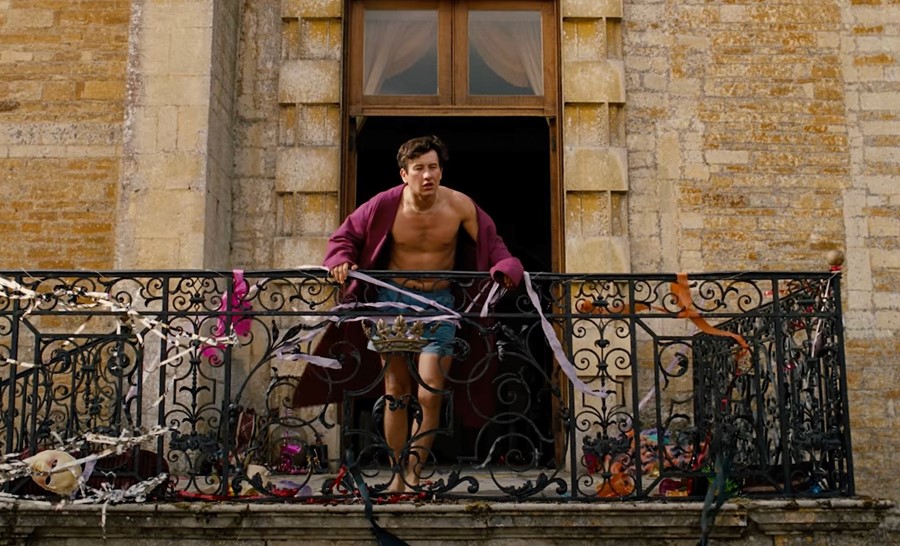Rich people are dancing through their mansions to ‘Murder On The Dancefloor’, and many are saying they’ve ‘missed the point’ of the film – but does this point even exist?
While the majority of us spent the Christmas break inside our sad little homes, watching Eastenders while eating too much, the other half spent theirs dancing through country piles in mock appreciation of Saltburn.
Since the film’s theatrical release just under two months ago, Emerald Fennell’s second outing has proved practically inescapable. Even if you haven’t watched the film, you’ve doubtless seen the discourse, scrolled past the Jacob Elordi fancams, witnessed endless discussions of a divisive “bathtub scene”. Buoyed by a recent Amazon streaming release, the film has captured the imagination of many, so much so that it birthed its own TikTok trend. During the film’s final scene, Barry Keoghan’s Oliver dances through the Saltburn manor naked to Sophie Ellis-Bextor’s “Murder On The Dancefloor” after [spoiler alert!!] killing off the Catton family and inheriting their estate. A quick glance at your For You Page, and you’ll see that posh people are now doing the same, either dancing through their own mansions (albeit fully clothed), or just generally showing off their huge homes to Ellis-Bextor’s vocal.
“Fun fact, Saltburn was actually based off our friendship group!” said one TikTok user semi-ironically, posting clips of candlelit dinners in stately dining rooms. “When Saltburn hit a little too close to home,” said another, accompanied by a video of her running through a vast estate. “I’m sorry, but I had to do this trend,” said a third, followed by – you guessed it – some very cool videos of some very posh debauchery. And Ellis-Bextor even got in on it too, posting a video of herself sliding down a stairwell to “Murder” this past New Year’s Eve. While some of these videos had grand pianos, and others might’ve had suits of armour, the common thread they’re intent on communicating is that these people are in a different tax bracket to you.
@dddelulu im sorry but i had to do this trend #saltburn #christmasparty #nyeparty #salburnhouse #fyp ♬ sophs awful edit thats gone viral - sophie
But no sooner had the trend emerged, did its critics swiftly follow. “I’m not so confident that we watched the same Saltburn,” said one comment. “It’s amazing how many people didn’t understand the point of Saltburn,” chimed another. On a separate video captioned ‘POV: family Christmas giving Saltburn’, one withering review just said ‘Saltburn is when big house’. And like clockwork, new media outlets began reporting on the social media reaction. Headlines like “Saltburn trend shows rich people ‘missed entire point’ of the film” echoed the internet’s initial response – but was this actually the case? Had the trend really missed the point of the film?
The critique of the videos is rooted in the belief that Saltburn is saying “rich people = bad.” You shoudn’t be flexing your rich person house on TikTok because because all the rich people die at the end, is essentially what people are getting at. But believing this seems to suggest the film is making more of a complex class commentary than it actually is. While the Cattons do meet varyingly grisly ends in the film, they’re never actually made out to be terrible people because of their class relations. Apart from their interpersonal issues and some good old-fashioned British eccentricities, the Cattons reputations as not terrible people remain fairly unscathed, and it’s the middle class Oliver who is the pariah. While wealth and class are the mechanism through which Oliver’s actions operate, his envy and desire are the forces that move the cogs.
Also, what’s most interesting to me about these videos is that these posh homeowners are taking the place of Oliver, the middle class usurper, from the original scene. Without even realising, the people in these videos are mocking the possibility of a Saltburn ever happening in their lives. To them, the film is not a cautionary tale, but a fictional one, and the trend shows that they are implicitly aware of that. They can safely dance through their mansions and show off all of their possessions because they know the likelihood of an Oliver taking everything from them is near impossible. If Fennell’s film really was such a cautionary tale against the perils of upper-class-ness – which it obviously is not – people would be hiding their homes, not showing them off on TikTok. The trend doesn’t miss the point of the film. The trend is depressing because it understands the class dynamics that the film perpetuates. That, essentially, we know how valuable their lives are, how covetable they seem to us. The very existence of this trend is proof that Saltburn’s class commentary at best is unsuccessful, and at worst, does not exist at all.
@caitlindarbyy fun fact, Saltburn was actually based off our friendship group !! #oxforduniversity #saltburn #jacobelordi #barrykeoghan #oxbridge ♬ Murder On The Dancefloor - Sophie Ellis-Bextor




